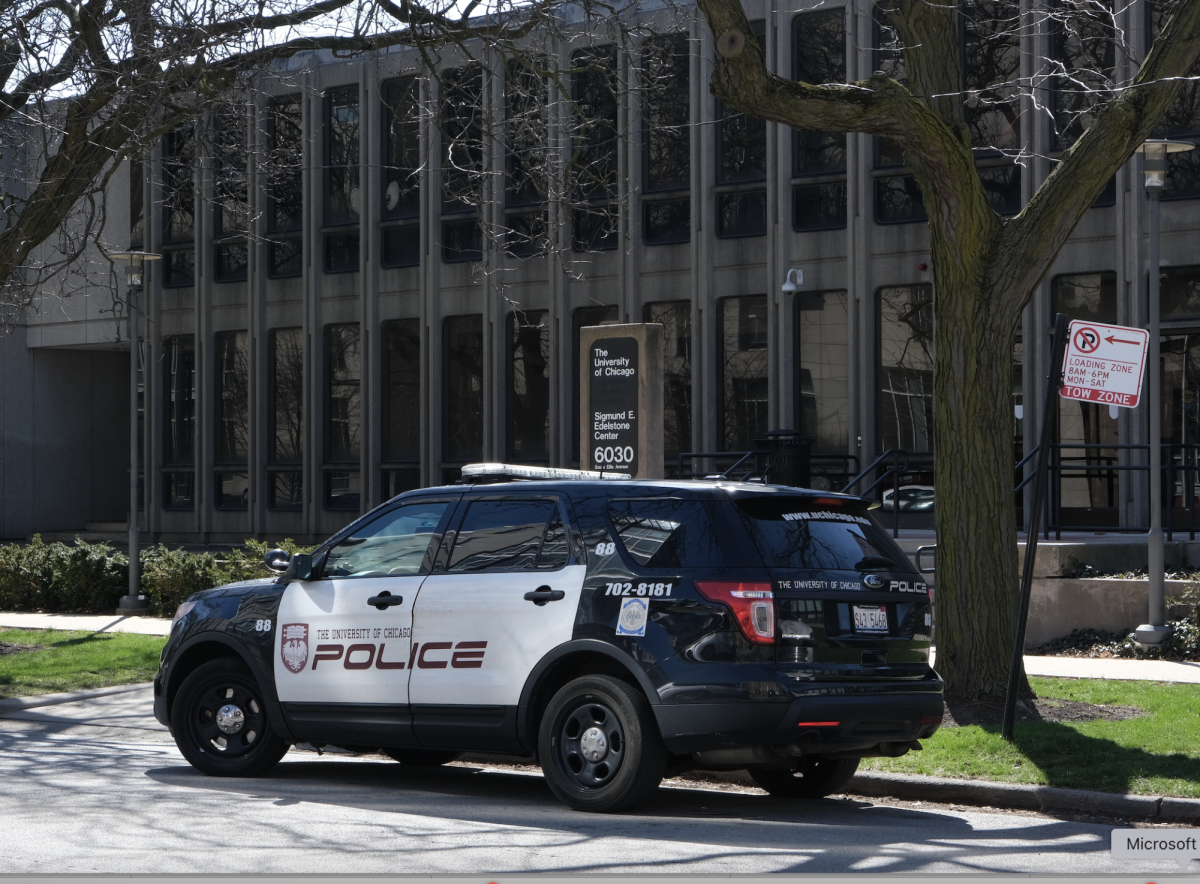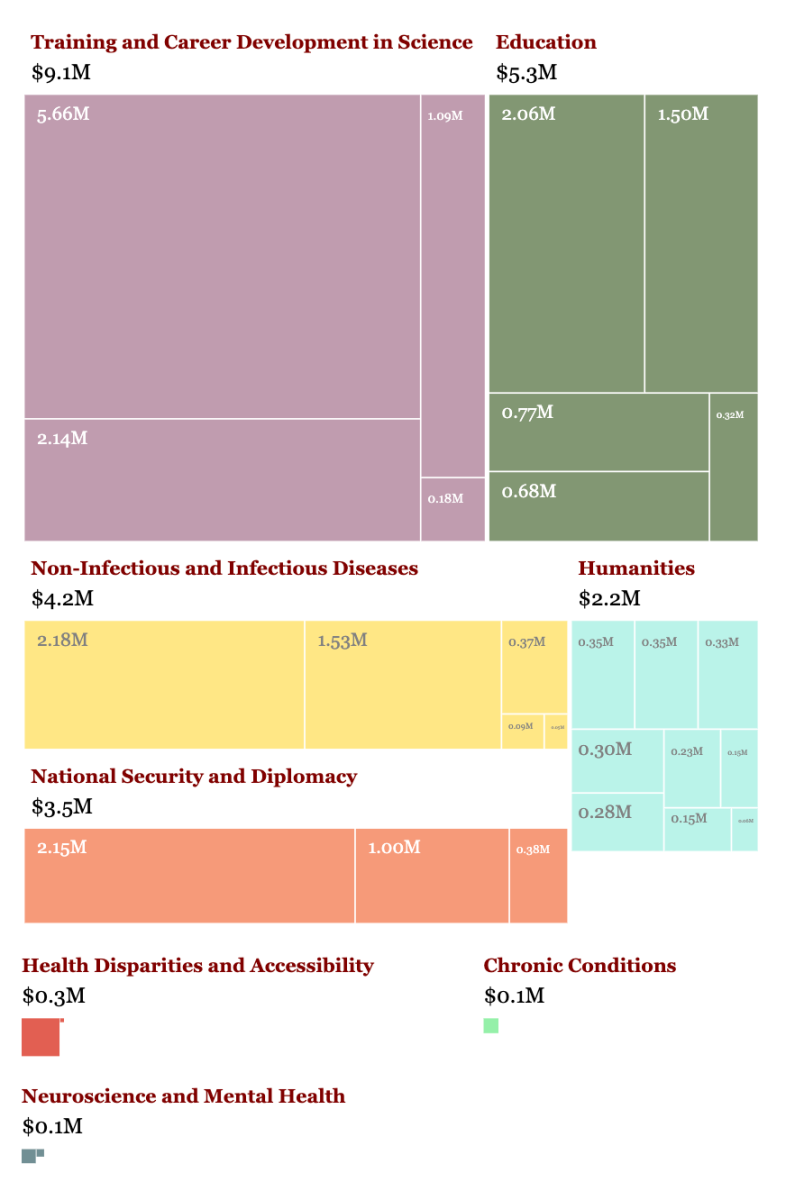In the 2023–2024 academic year, the University-Wide Standing Disciplinary Committee on Disruptive Conduct saw a surge in disciplinary cases brought against students who had allegedly engaged in disruptive conduct related to pro-Palestine protests.
As individual cases played out, University administrators faced criticism from faculty over the Standing Committee’s governance, including allegations that Provost Katherine Baicker appointed faculty members and chairs to the Standing Committee, as well as faculty chairs to ad hoc committees for specific disciplinary cases, without faculty consultation.
Concerns about limited faculty oversight and a lack of transparency regarding the committee’s governance structure led some council members to believe the administration was exerting disproportionate influence over internal disciplinary proceedings.
“There were ample grounds for a perception or suspicion that students were not being afforded due process,” a former spokesperson (FS) of the Committee of the Council told the Maroon this May. The FS—who held the highest position of faculty governance on the Committee—spoke on condition of anonymity for this article.
Disciplinary System Overwhelmed
Last year, the University-Wide Standing Disciplinary Committee on Disruptive Conduct operated with lower membership and higher caseloads than in previous years.
“[It] was the first big test of how these kinds of systems functioned,” said Dan Morgan, a Cinema and Media Studies professor and Committee of the Council member. The Former Spokesperson (FS) of the Committee of the Council explained that the volume of disciplinary cases last year was “several orders of magnitude larger” than in previous years, which “overwhelmed the process.”
A University spokesperson confirmed to the Maroon that the Standing Committee had 14 members during the 2023–2024 academic year.
This year, membership has increased to 26, with one additional member in reserve, according to the spokesperson.
Changes to Disciplinary Committee Leadership Fuel Concern
In addition to increases in caseloads, structural changes to the Standing Committee and ambiguity surrounding decision-making authority led some council members and faculty to believe that disciplinary procedures were operating differently from established policy.
According to the Disciplinary System for Disruptive Conduct policies, the Provost will consult the annually appointed spokesperson of the Committee of the Council before appointing members to the University-Wide Standing Disciplinary Committee on Disruptive Conduct.
By the end of the 2023–24 school year, the Office of the Provost had not consulted, at minimum, the last four spokespeople when appointing members of the Standing Committee, according to reports of a Council of the University Senate meeting held on June 7, 2024 reviewed by the Maroon.
“After the Provost and a past Spokesperson realized this step had not been followed in practice for several years, they rectified the process moving forward,” a University spokesperson told the Maroon.
The Standing Committee’s publicly listed philosophy professor Matthew Boyle and statistics professor Mary Silber as its faculty chairs during the 2023-2024 school year.
However, English professor and Committee of the Council member Julie Orlemanski, as well as FS, told the Maroon in 2025 that, as they understood the situation, neither one of these professors chaired the ad hoc disciplinary committee that was convened to hear disruptive conduct allegations related to the encampment. Additionally, neither professor made recommendations regarding the formation of this ad hoc committee.
It was unclear to FS who was acting as a faculty chair in the ad hoc committees for encampment-related disciplinary cases.
Boyle wrote in an email to the Maroon that he was involved in another disciplinary case and was therefore not asked to chair encampment-related proceedings.
Silber did not respond to a request for comment by time of publication.
When asked why Boyle and Silber were not involved in these disciplinary proceedings, a University spokesperson wrote to the Maroon, “A single Faculty Chair is assigned for each disruptive conduct matter. The Chairs serve on a rotation and additional Standing Committee members can be appointed as a Chair to address unavoidable issues, such as conflicts of interest or availability concerns. Each Chair works independent of the other Chairs, and students involved in the process are made aware of the Chair that is working on their matter.”
Faculty chairs are the faculty members given the most power in disciplinary proceedings; the Picker Report, which in 2017 established the University’s current disciplinary system, states that administrators should consult the chair on a variety of major case decisions. chairs make the decision to convene ad hoc committees where faculty members serve on specific disciplinary cases, such as those related to the encampment, with oversight from another faculty chair. Additionally, the chair can decide whether graduating students in ongoing disciplinary cases can receive their degrees or participate in convocation.
At a Council of the University Senate meeting held over in summer 2024, Baicker explained that a faculty member had resigned as chair of the Standing Committee in autumn quarter 2023 and Baicker had appointed another chair prior to the establishment of the encampment, according to FS.
The third faculty chair appointed mid-year by Baicker was chemistry professor Bryan Dickinson, Orlemanski wrote to the Maroon in 2025.
As faculty chair for the Standing Committee, Dickinson decided to form an ad hoc committee for encampment disciplinary cases and served as its chair, Orlemanski said. She did not know who the old faculty chair who resigned was, nor exactly when prior to the encampment Baicker had appointed Dickinson.
Dickinson declined to comment about why his position was not made public at his time of appointment, saying that he was unable to speak to University decisions. The University lists Dickinson publicly as one of the faculty chairs for the 2024–2025 academic year, along with law professor Richard McAdams and Ben May Department of Cancer Research professor Marsha Rosner.
At a June 7 Council of the University Senate meeting, a faculty member suggested that the vacant faculty chair seat should have been filled immediately, instead of after a delay. They said that the timing of the appointment gave the impression that the administration was making changes to governance as reactions to specific events, according to reports reviewed by the Maroon.
For FS, the lack of public acknowledgment about the appointment of a third faculty chair, combined with confusion about the process for appointing them, raised concerns.
Specifically, FS was concerned that ambiguous language in the Picker Report about the appointment of a faculty chair could lead to multiple discrepancies between the published policy and how the process was unfolding in practice, they told the Maroon in 2025. The Picker Report does not explicitly state who appoints a faculty chair to the Standing Committee or ad hoc committees for specific cases.
A June 3 email from Jeremy Inabinet, the Associate Dean of Students in the University, Center for Student Integrity, reviewed by the Maroon states that Standing Committee faculty chairs are appointed through the Office of the Provost.
A University spokesperson confirmed to the Maroon that, “In consultation with the Spokesperson of the Committee of the Council, the Provost appoints members and chairs of the Standing Committee.” Additionally, the spokesperson wrote that the associate dean of students in the center for student integrity chooses ad-hoc committee members from the Standing Committee “based on factors such as availability, schedules, and avoidance of conflicts of interest.”
During last year’s disciplinary proceedings and their aftermath, several faculty members and protesters expressed concerns to the Maroon about the disproportionate influence over proceedings they perceived the admin to have.
One protester who was subject to the University disciplinary system multiple times told the Maroon in 2025 that, for the post-encampment hearings, “It was clear that faculty had little to no power,” the protester said.
Mathematics professor Denis Hirschfeldt claimed to the Maroon in May 2024 that the appointment of the ad hoc chair to the disciplinary committee overseeing encampment-related cases allowed the University to withhold degrees and circumvent the preexisting committee faculty chairs.
“The concern is that… the Provost has significant leeway to sideline faculty participation and to engineer disciplinary committees that are likely to produce the outcome that the administration may prefer,” history professor Gabriel Winant told the Maroon in 2025.
Overall, faculty are concerned that they will “lose their role in adjudicating and advocating for students,” he explained.
Disciplinary Proceedings Outcomes: Degrees Withheld
In late May 2024, four graduating students involved in the pro-Palestine encampment were informed that their degrees were being withheld pending disciplinary proceedings against them. A student involved in the IOP occupation received a similar message on May 31. Six non-graduating students also faced disciplinary sanctions for participating in the encampment.
Ultimately, the degrees were conferred, and the other six disciplinary cases were dropped by early August.
In an email Inabinet sent to Christopher Iacovetti, an organizer with Students for Justice in Palestine (SJP) and one of the non-graduating students who faced discipline, Inabinet informed him that he “and multiple other individuals disrupted the operations of the University by occupying space on the main quadrangle.”
When asked by Iacovetti to clarify what the specific allegation against him was, Inabinet wrote, “you were identified as having participated in the quad encampment and potentially holding a leadership role with regard to the encampment and UChicago United for Palestine.” Inabinet informed Iacovetti that his case would be evaluated “on both an individual and group basis.”
In a July 2024 interview with the Maroon, Iacovetti argued that the University’s disciplinary proceedings engaged in what he called a “notion of collective responsibility,” which he said was “precisely the notion that student organizers have been trying to impress upon the University of Chicago administration for months” through their protests.
Iacovetti declined to speak with the Maroon for this story.
Michelle Ward, a Master of Arts Program in the Humanities (MAPH) student whose degree was withheld, was presented with photos of herself wearing a keffiyeh in her apartment building lobby as evidence that she had participated in the IOP occupation.
An internal Division of Humanities email obtained by the Maroon informed faculty that Ward was identified in “video footage that shows what we believe to be her directly involved in this matter” and that “UCPD’s investigation is ongoing and may result in criminal charges.”
Ward could not be reached for comment, and the Maroon did not find any record of criminal charges brought against her. At time of publication, it is still unclear how the photos were obtained. A University spokesperson declined to share information about the matter in August, citing federal privacy laws.
The students whose degrees were withheld were informed that they would be permitted to attend convocation-related ceremonies but would not receive their diplomas. At least 100 students walked out during the University’s convocation ceremonies in protest; police arrested one individual and allegedly used pepper spray after protesters clashed with UCPD at a closed intersection. According to the University’s account of the situation, the individual had “acted violently” against police and charges were sought for battery.





















